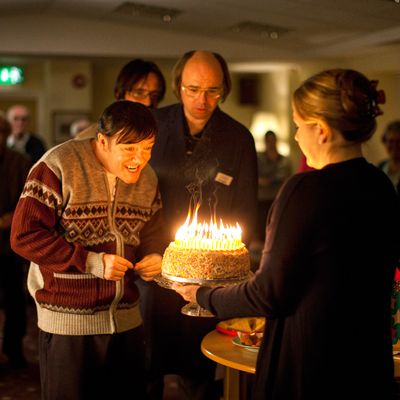
Ricky Gervais’s retirement-home sitcom Derek is no masterpiece. Its Office-style pseudo-documentary gimmicks seem even less organic here than in most shows of this type, and the improv is hit-and-miss, as improv usually is. But this Netflix series is worth seeing, if only to be able to have an opinion on its peculiar mix of tones, and to decide whether you think it’s sincere or cloyingly manipulative. Derek is engaging and sometimes very funny. Parts of it are ostentatiously sentimental, verging on gooey.
That last aspect is the most intriguing. Based on his career highlights to date, most of which are geared toward taking the piss out of everything, I never thought I’d see a Gervais project that spent most of its screen time observing residents of an elder care facility while “bittersweet twilight of life” piano music toodles on the soundtrack. But that’s what Derek does when it’s not focusing on the retirement home staff, most of whom are melancholy or prematurely lost souls, or milking all the laughs it can from community events, including a cabaret show and a trip to the beach.
Gervais’s titular retirement-home staffer — who another character speculates is autistic — is a socially inept goofball who blurts out whatever’s in his head. When he’s sitting with the residents in a common area, you might think he’d prematurely “retired” there by mistake; but he’s an angel, this one. A good person. Really good. “He doesn’t have much going on in his head, but what he has going on is all good,” another character says. Sweeter still is Hannah (Kerri Godliman), the home’s manager. She’s endlessly patient as she balances the egos and petty grievances of the staff, the needs of her residents, and fund-raising to replace money lost to budget cuts. When Derek and Hannah go out together and some abusive bar patrons make fun of him, she head-butts them. She is, as Derek describes her, an angel. A head-butting angel.
Derek’s colleagues are eccentrics. Kev (David Earl) doesn’t actually work at the home, but he’s around all the time, and everyone else seems okay with that, even though he blurts out sexual innuendo the way other people say “Hello” and “How are you?” The home’s caretaker, Dougie (Karl Pilkington), is a balding loner whose workshop is his sanctum. His monologues about the home’s residents and staff are the highlights of any given episode. Whether analyzing others or beating up on himself, he’s honest, sometimes painfully so, and there’s blunt wisdom in his grousing. “I’m not proud of me own life,” he says, following a scene in which another character casually voids himself during a conversation. “I’ve never done anything special. I haven’t achieved anything. But I can say on my mother’s life I have never shat me pants.”
Parts of Derek veer toward “empathy” rather than empathy, as if the main goal is to convince people that the storytellers are good and kind people. For all the poignant or lyrical interludes — including a collective dream sequence in which residents imagine their younger selves — the residents rarely come alive as individuals. They’re “the elderly” or “our future” or somesuch. This blunts a lot of the impact that the show seems to want to have.
Still, problematic as these aspects may be, it’s hard to entirely resist Derek, partly because you almost never see this world represented on TV, but mostly because, like Gervais himself, it prides itself on creating moments that you aren’t quite sure how to take. How’s this for a DVD box blurb: “The year’s funniest sitcom about loneliness, failure, and fear of death.”


